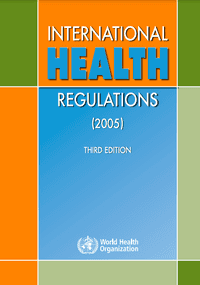
Languages: English, Spanish, French... (6)
International Health Regulations
[IHR]
The IHR are a set of regulations that define the requirements and authorities for WHO and Member States with respect to assessing, detecting, and reporting the international spread of disease that pose a threat to public health. The IHR covers all diseases, and gives the WHO the power to declare a public health emergency of international concern (PHIEC).
SUMMARY
The International Health Regulations (IHR) are an international agreement that aims to prevent, protect against, control and provide a public health mechanism for response to the international spread of disease in ways that enact the appropriate level of reaction based on the risks posed by the disease at hand, and which avoid unnecessary interference with international traffic and trade. The IHR were first published in 1969 by the World Health Organization (WHO); the 3rd, and also most recent, edition was written in 2005 and came into effect in 2007. The IHR are legally binding for the 196 Member States, and requires States to notify the WHO about any event that may constitute a public health emergency of international concern. They are written in a broad way to cover many different types of public health threats. The IHR also requires Member States to set up national legislation and surveillance networks to legally and scientifically be able to track and respond to public health emergencies.
The IHR also establishes the criteria for the WHO to designate an event as a Public Health Emergency of International Concern (PHEIC), and allows the WHO to coordinate States’ response to the event. As of 2021, there have been 7 declared PHEICs. The IHR maintains an Expert Roster that can be called upon by the WHO Director General for advice on declaring PHEICs or other public health emergencies. Member States are required to designate a National IHR Focal Point that is available around the clock to notify, consult and coordinate with the WHO on their IHR responsibilities.

..png)
